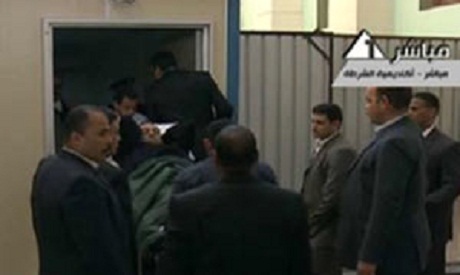
Egypt's ousted President Hosni Mubarak wheeled into the courtroom before the trial procession (Photo: snapshot from state television)
The fifth session in the trial of ousted president Hosni Mubarak, along with his two sons, former minister of interior Habib El-Adly and six of his aides, proceeds today at the Police Academy headquarters after a three-month pause. All defendants arrived on the premises amid heightened security presence.
Martyrs' families gathered outside the Police Academy headquarters this morning, some carrying signs demanding Mubarak's execution, while a small number of Mubarak supporters began appearing on the premises as well.
Mubarak is accused of corruption and conspiring to kill nearly 846 unarmed protesters during the revolution that led to his ouster. Six former interior ministry officials face similar charges.
In this coming session, the judge is likely to set a new date for Chief of Staff for the Supreme Council of Armed Forces (SCAF) Sami Anan’s testimony, according to Gamal Eid, the head of the Arabic Network for Human Rights Information and one of the martyrs’ lawyers.
Anan is considered one of several vital witnesses in Mubarak’s trial along with former head of intelligence Omar Suleiman, and former ministers of interior Mahmoud Wagdi and Mansour El-Eissawy.
The testimony of Anan, scheduled for 24 September, was delayed after the lawyers of revolution martyrs filed a motion accusing Judge Ahmed Refaat and the panel of judges presiding over the case of bias against them. Cairo’s Court of Appeal rejected the motion to disqualify Judge Refaat and the panel.
The martyrs’ lawyers stated that Refaat did not allow them to cross-examine the head of SCAF Field Marshal Hussein Tantawi during his controversial testimony. Tantawi insisted that Mubarak never asked the army to shoot at protesters during the January 25 Revolution, conflicting with his earlier statement that the army did not shoot because it refused Mubarak’s orders to do so.
The lawyers alleged that Refaat favoured Mubarak because the judge’s brother, Essam, was an active member of the now-defunct National Democratic Party (NDP) and its Policies Committee, led by Gamal Mubarak, son of the former president.
In addition, the martyrs’ lawyers claimed they had documents of earlier rulings issued by Refaat in favour of business tycoon Hussein Salem, who faces multiple charges of money laundering and illegal profiteering along with Alaa and Gamal Mubarak.
Judge Refaat and the judges’ panel sent a memo to the Court of Appeal defending the panel and denying the lawyers’ accusations. The Court of Appeal announced on 22 October that it needed time to examine Refaat’s records, and on 7 December it rejected the motion against him, fining the lawyers who filed the motion LE6,000 ($996).
Eid told Ahram Online that fines for such motions is common practice to guarantee that such measures are not used in the future to further delay the case.
Though Eid believes the court is biased and there is no political will to actually try the accused, he says the case against Mubarak is very weak.
“If I was Mubarak’s lawyer I could prove him innocent,” Eid explained. “How is exporting gas to Israel linked to killing the revolutionaries? These are two different cases put in one which is bad for our case.”
The ousted president, who has been detained in an army hospital outside of Cairo since the trial started last August, is also accused of conspiring with former Minister of Petroleum Sameh Fahmy to export gas to Israel at below-market prices through a company which Hussein Salem was a majority stock-holder.
Eid pointed out other problems the prosecution faced. Besides the accused being called upon as witnesses, the martyrs’ lawyers are not given sufficient time to make their case in court and are campaigned against in the media.
Short link: